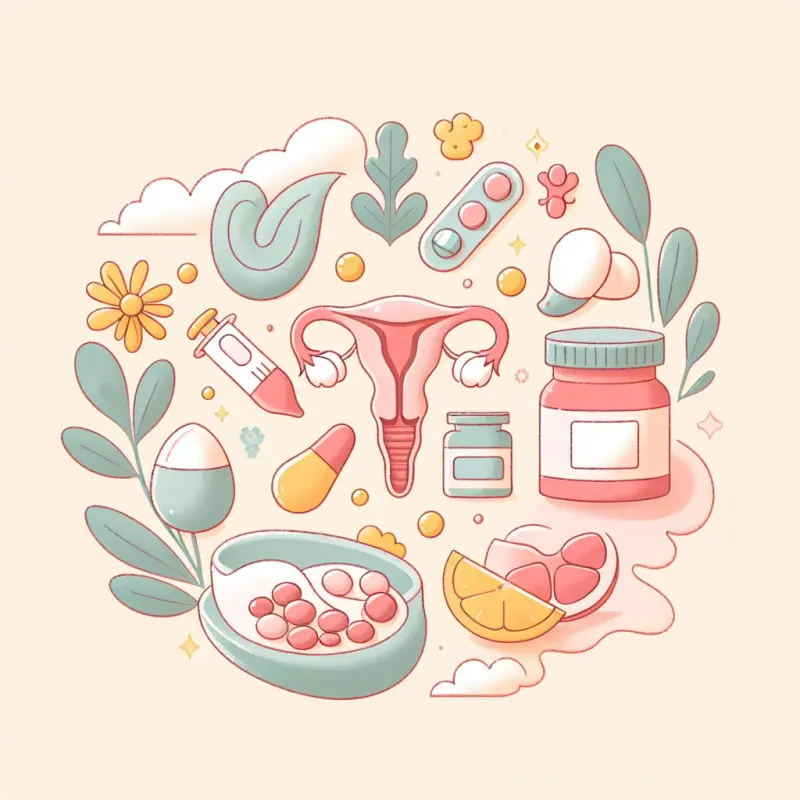Micronutrients and Menstrual Health: Iron, Magnesium, and More

Micronutrients and Menstrual Health: Iron, Magnesium, and More
The menstrual cycle is a natural and essential part of life for many individuals, playing a crucial role in reproductive health. However, it often brings with it a range of physical and emotional symptoms that can impact daily life. While many factors contribute to menstrual health, nutrition—especially micronutrient intake—plays a significant role. This article explores the importance of micronutrients like iron, magnesium, and others in supporting menstrual health, offering insights into how they can help manage symptoms and improve overall well-being.
Introduction
Understanding the menstrual cycle and its effects on the body is vital for promoting health and well-being. For many, menstruation is accompanied by symptoms such as fatigue, cramps, mood swings, and irregular cycles. While these symptoms can be challenging, they can often be alleviated through dietary adjustments, particularly focusing on micronutrients. These essential vitamins and minerals, though required in small amounts, have a significant impact on bodily functions and can enhance menstrual health.
The Role of Micronutrients in Menstrual Health
Micronutrients are nutrients required by the body in minute quantities and include vitamins and minerals essential for growth, development, and disease prevention. When it comes to menstrual health, certain micronutrients stand out due to their specific roles in alleviating symptoms and regulating the menstrual cycle.
Iron: Combatting Fatigue and Anemia
Importance of Iron
- Oxygen Transport: Iron is a crucial component of hemoglobin, the protein in red blood cells that carries oxygen from the lungs to the rest of the body. Adequate levels are essential for energy and vitality.
- Anemia Prevention: Menstruation can lead to significant iron loss, increasing the risk of iron-deficiency anemia, which is characterized by fatigue, weakness, and dizziness.
Iron-Rich Foods
Ensuring sufficient iron intake is crucial, especially for those with heavy menstrual bleeding. Here are some iron-rich foods to include in your diet:
- Red meat, poultry, and seafood
- Beans and lentils
- Tofu
- Spinach and other dark leafy greens
- Fortified cereals
Tips for Enhancing Iron Absorption
- Vitamin C Pairing: Consuming vitamin C-rich foods like citrus fruits, strawberries, or bell peppers alongside iron-rich foods can enhance iron absorption.
- Avoid Inhibitors: Be mindful of substances that inhibit iron absorption, such as tannins in tea and coffee, and calcium supplements, which should not be consumed at the same time as iron-rich meals.
Magnesium: Easing Cramps and Mood Swings
Importance of Magnesium
- Muscle Relaxation: Magnesium plays a role in muscle function and can help alleviate menstrual cramps by relaxing uterine muscles.
- Mood Regulation: It contributes to neurotransmitter function, which can help manage mood swings and irritability associated with PMS.
Magnesium-Rich Foods
Incorporating magnesium-rich foods into your diet can help in managing menstrual symptoms:
- Nuts and seeds (almonds, sunflower seeds)
- Whole grains (brown rice, quinoa)
- Dark chocolate
- Avocados
- Bananas
Supplementation and Dosage
While food sources are ideal, magnesium supplements can be considered if dietary intake is insufficient. Consulting a healthcare provider for appropriate dosage is recommended.
Calcium and Vitamin D: Supporting Bone Health and Hormonal Balance
Importance of Calcium and Vitamin D
- Bone Health: Both calcium and vitamin D are vital for maintaining strong bones, which is particularly important during menstruation when bone density can be affected.
- Hormonal Balance: Vitamin D plays a role in hormone production and regulation, which can help stabilize menstrual cycles and reduce PMS symptoms.
Food Sources
- Calcium: Dairy products, fortified plant milks, leafy greens, and almonds.
- Vitamin D: Fatty fish (salmon, mackerel), fortified foods, and sunlight exposure.
B Vitamins: Reducing PMS Symptoms
Importance of B Vitamins
- Energy Production: B vitamins, particularly B6, are involved in energy production and can help combat fatigue.
- Mood Improvement: They play a role in serotonin production, which can alleviate mood swings and depression associated with PMS.
Food Sources
- Whole grains
- Meat and poultry
- Eggs
- Nuts and seeds
- Legumes
Zinc: Supporting Immune Function and Hormonal Health
Importance of Zinc
- Immune Support: Zinc is essential for a robust immune system and can help prevent infections during menstruation.
- Hormonal Health: It plays a role in hormone production and can help regulate the menstrual cycle.
Food Sources
- Shellfish
- Meat
- Chickpeas
- Pumpkin seeds
- Fortified cereals
Integrating Micronutrients into Daily Life
Balanced Diet
A balanced diet rich in whole foods is the foundation of good health. Emphasizing a variety of nutrient-dense foods ensures adequate intake of essential micronutrients.
Mindful Eating
- Regular Meals: Eating regular, balanced meals can help maintain energy levels and stabilize mood.
- Hydration: Staying hydrated is crucial, as dehydration can exacerbate menstrual symptoms.
Lifestyle Factors
- Exercise: Regular physical activity can improve circulation, reduce stress, and alleviate cramps.
- Stress Management: Techniques such as yoga, meditation, or deep breathing can help manage stress, which can impact menstrual health.
Conclusion
Menstrual health is influenced by a multitude of factors, with nutrition playing a pivotal role. By focusing on the intake of essential micronutrients like iron, magnesium, calcium, and vitamins, individuals can manage menstrual symptoms more effectively and promote overall well-being. A balanced diet, mindful eating, and healthy lifestyle choices are key to supporting menstrual health and enhancing quality of life. With a deeper understanding of the role of micronutrients,